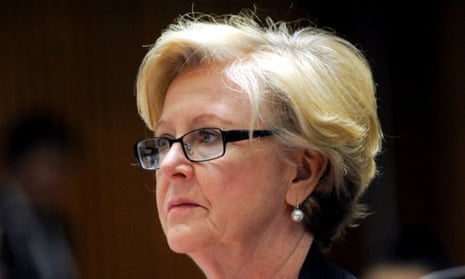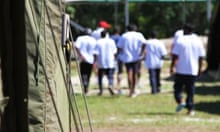A report documenting the desperate state of medical provision inside Australia’s detention centres on Nauru will be considered as evidence in the Australian Human Rights Commission’s (AHRC) inquiry into children in detention as agencies expressed serious concern about the report’s findings.
The president of the AHRC, Gillian Triggs, said the report, written by five independent medical experts and obtained by Guardian Australia, articulated issues of “profound concern” to the inquiry being conducted by a statutory, independent body.
The AHRC is not permitted to visit Australia’s offshore detention centres as it does not have extraterritorial jurisdiction, but Triggs said the conditions for child asylum seekers offshore and the Australian government’s decision to send children offshore were part of the inquiry’s remit.
The report notes that children are inadequately health screened and up to 50% of those on Nauru could carry latent TB. It also raises serious concerns that there is no clear child protection framework on Nauru and that most pregnant women are suffering from depression.
Triggs said the evidence in the report supported many of the inquiry’s observations of children in mainland detention and on Christmas Island, adding: “If it is true that they are being given very cursory health checks then that again underpins the point that they are being held in a way that cannot be justified on any rational or practical basis.”
Triggs said that a letter of concern documenting widespread medical failings in detention, written last November and signed by 15 doctors operating on Christmas Island, would also be used as evidence in the inquiry.
The chief executive of Unicef Australia, Norman Gillespie, said that the report confirmed their “fears for children and pregnant mothers in Australian immigration detention”.
“That children are being exposed to chronic diseases, delayed treatment and deteriorating health while under the protection of Australia is of great concern,” Unicef Australia’s advocacy manager, Amy Lamoin, said.
“The government must uphold its responsibilities and ensure that children in its care have access to adequate standards of health care and protection. We request the minister respond in full to this report and explain how he will ensure the safety and health of the children under his care.’
Both the United Nations and Amnesty International have been refused entry to the Nauru detention centre in recent months, and the centre’s operations are cloaked in secrecy.
The coordinator of Amnesty Australia’s refugee campaign, Graeme McGregor, said one of the organisation’s principal concerns with the report was that it would not have been made public if it had not been leaked.
“That is extremely concerning and it really shows the secrecy surrounding this policy of offshore detention and what it may, in fact, be hiding. Amnesty were denied access to visit Nauru earlier this year and this is exactly the kind of thing we were afraid of – that the denial of access was being used to hide this kind of abuse.”
McGregor continued: “In particular we’re concerned about the lack of processes and protections for children who have been subjected to physical or sexual abuse, and really we feel that failures of this policy mean that if a child was being sexually or physically abused that nothing effective can be done about it, and also that the public in general would never find out about it.”
On Friday the immigration minister, Scott Morrison, said the report, which was filed about two months ago, was “of some time ago”. Morrison told reporters that the commander of operation sovereign borders, Lt-General Angus Campbell – who is not medically qualified –had given him a “very positive report” of the centre’s conditions subsequently.
Greens senator Sarah Hanson-Young said the leaked report revealed a “mental health crisis in the Nauru detention camp”.
“This damning report reveals the truth of Nauru and the horrific conditions that children are being exposed to on a daily basis,” she said.
“There is no paediatric life support on the island and conditions in the Nauru hospital are clearly unacceptable.”
Hanson-Young also provided photographs of conditions inside the maternity ward, which she said “show the true condition” in Nauru’s only hospital.
Sophie Peer, of the child asylum seeker advocacy group ChilOut, said the report revealed that the lives of child asylum seekers were being put at risk on Nauru.
“There is no excuse for endangering the life, health and safety of a child,” Peer said.
“We have never believed the line that offshore detention is about saving lives. Now we have even more detailed evidence that Australia is in fact putting lives at risk.
“Without question it is time to put aside political point-scoring and get people out of this dangerous detention facility. If this is not done, the result could be fatal.”
ChilOut said it believes there are more than 40 unaccompanied children detained on Nauru, and expressed particular concern, as does the report, about their safety and welfare.
Ian Wishart, the chief executive of Plan international, a global child rights NGO, said: “These children are being denied their most basic rights to healthcare and protection on our government’s watch. Australia has a legal and moral obligation to do better.
“Children are the innocents in all this. The majority do not make the decision to come to Australia, and nor are they able to stand up for the rights every single parent in Australia would expect for their own children."




Comments (…)
Sign in or create your Guardian account to join the discussion